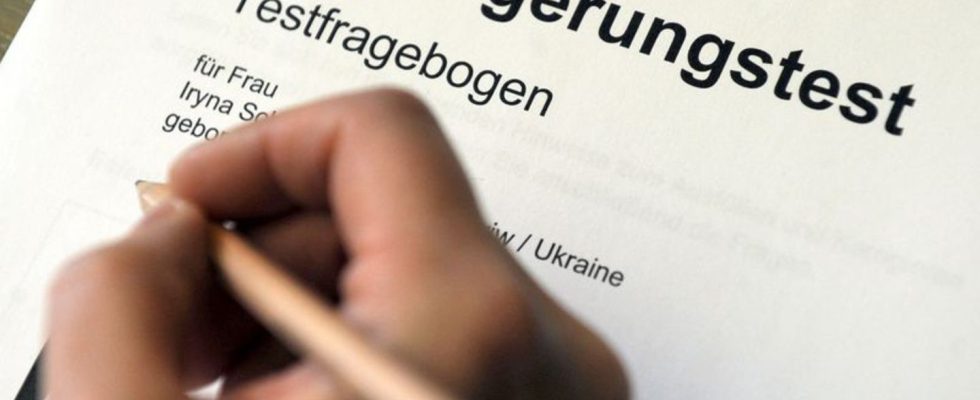Opinion poll
Naturalization reform: No majority for the double passport
Written German exams and a naturalization test should be avoided for older people who once came to the country as workers through state agreements. photo
© Uli Deck/dpa
The traffic light coalition wants to change nationality law. A majority of people in Germany like the fact that naturalization should be made easier for former “guest workers”.
The lowering of hurdles planned by the traffic light coalition Naturalization convinced around half of the population in the spring. This is shown by the results of a representative survey by the German Center for Integration and Migration Research (Dezim), which is available to the German Press Agency. At the time of the survey – between the end of March and the beginning of May – individual aspects of this proposed law were still significantly more popular.
In response to the more general question “How do you view the suggestion that the German passport can be acquired more easily under certain conditions?” 49 percent of those surveyed then answered positively. 34 percent of the Germans and foreigners surveyed expressed negative opinions. The answers from 17 percent of the almost 3,000 people who took part in the survey were in the middle.
The study does not reveal whether attitudes towards the reform of nationality law may have changed since then as a result of recent developments and debates on asylum policy and labor immigration. The Bundestag will discuss the project for the first time this Thursday.
Naturalization should come faster
According to the cabinet decision, immigrants should in future be able to become citizens after just five years of residence in Germany. Previously, they had to live in the country for eight years. If you perform well at school or at work, have good language skills or do voluntary work, naturalization should be possible after just three years.
Anyone who wants to have a German passport should no longer have to give up their old one in the future. This already applies to EU citizens and some special cases, but not, for example, to people from Turkey or the Western Balkan states.
Written German exams and a naturalization test should be avoided for older people who once came to the country as workers through state agreements. You just have to prove that you can communicate in German in everyday life without any significant problems.
63 percent of the people surveyed by Dezim liked the fact that the draft provides relief for former “guest workers” and foreign contract workers in the GDR in recognition of their life’s work. 16 percent of people living in Germany viewed this proposal negatively. 22 percent of the survey participants chose a middle value on a scale from “very good” to “very bad”.
43 percent of the population viewed the possibility of dual citizenship for all those wishing to become naturalized as positive, while 37 percent thought it was bad. One in five people said neither positive nor negative about this part of the planned reform.
Jannes Jacobsen, one of the authors of the study, raises fundamental concerns. “It is questionable whether the planned reform can close the existing gaps,” he says. In some cases it could lead to a German passport more quickly – but in others it could also increase the individual hurdles.”
For example, the circle of those who can be naturalized at their discretion in the event of particular hardship, even if they cannot support themselves, would be smaller if the draft law is passed in its current form.
Few exceptions
One of the few exceptions that will continue to exist in the future are former guest or contract workers. Among them are many – especially women – who are partly dependent on social benefits in old age due to long-term employment in the low-wage sector. According to current law, the prerequisite for naturalization is that someone is able to support themselves and their relatives. However, this can be waived “to avoid particular hardship.
With regard to the requirement to cover one’s own living expenses, the Greens and SPD factions could imagine making changes or more exceptions to the parliamentary procedure – for example for single parents.
The FDP is reportedly considering whether, in addition to anti-Semitism as a reason for exclusion, those wishing to become naturalized should also be required to acknowledge the State of Israel’s right to exist. At this point, we are generally open to making things more specific, said the SPD parliamentary group’s domestic policy spokesman, Sebastian Hartmann. However, a naturalization authority has no investigative authority and does not become a court.
According to another survey by Dezim, about one in two of the foreigners living in Germany are interested in acquiring German citizenship or have already applied for it. Immigrant women therefore have a greater interest in a German passport than immigrant men. The migration researchers interviewed around 430 people who live in Germany without German citizenship.

